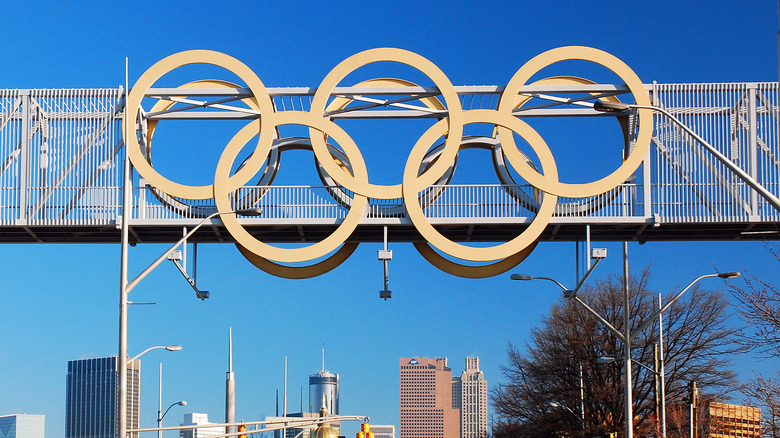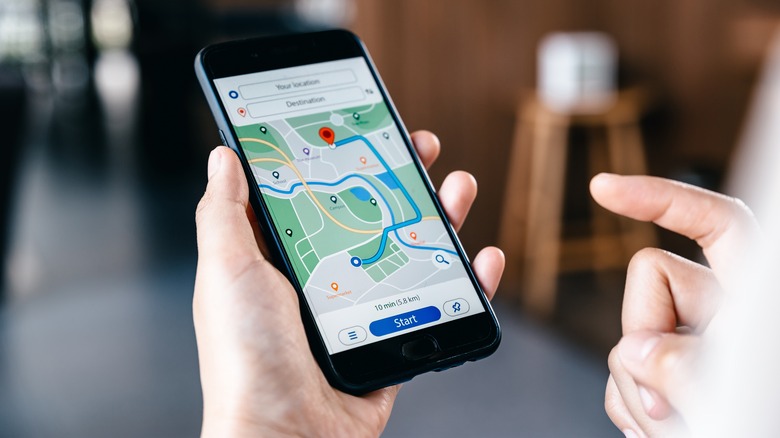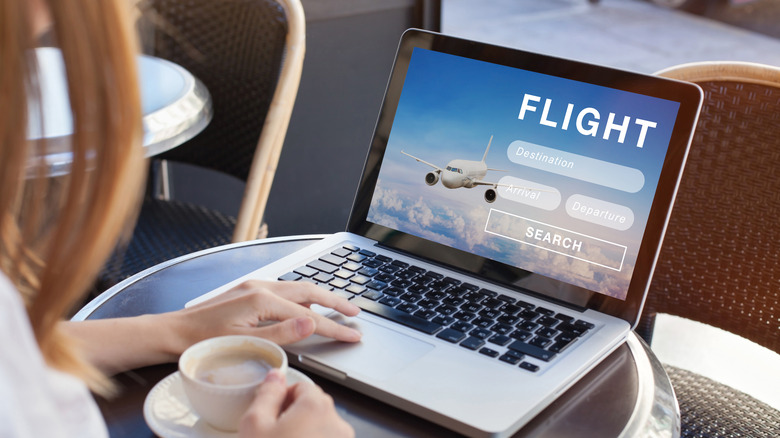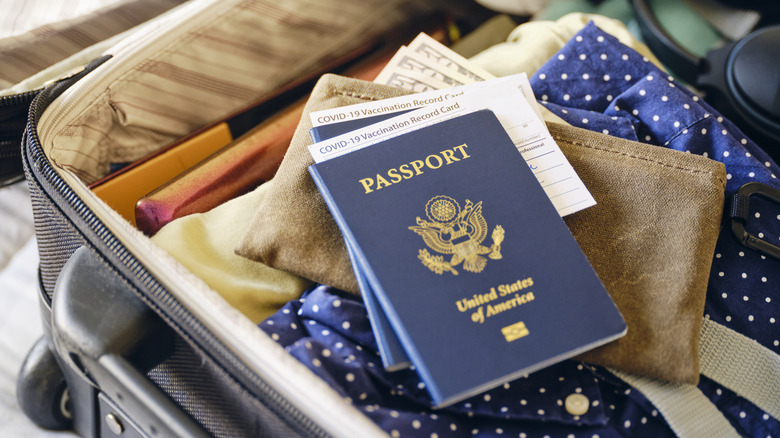11 Things You Need To Know About Traveling To The Olympics
Whether during their ancient run in 776 B.C. to 393 A.D. or since their modern revival in 1896, the Olympic Games have always drawn crowds from near and far. Today, thousands of athletes from hundreds of countries participate, and millions of people attend the Olympic and Paralympic Games as spectators. According to Paris 2024 — the official ticketing website of the 2024 Olympics held in Paris, France — nearly 10 million tickets are "set to go on sale." But despite the Games' popularity, being able to attend a competition can be surprisingly complicated.
Witnessing amazing physical exploits and being a part of the cheering Olympic crowd in person is an unforgettable experience; traveling to the place where the Games are held can be, as well. But enjoying both to the fullest takes preparation, planning, and several major advance purchases. In a sense, you could say Olympic travel is a bit like being an Olympic or Paralympic athlete — you'll have to think ahead, call on a lot of different skills, and go for the Gold (in this case, the trip of a lifetime). There are some essential things you'll need to know about traveling to the Olympics, but with some preparation, you'll be well on your way to victory.
Choose your events wisely
In most modern-day Olympic and Paralympic Games, it's more or less impossible to attend every event. The Paris 2024 website notes, for example, that the 2024 Summer Olympic Games will feature 32 sports and 329 events, and the 2024 Summer Paralympic Games will feature 22 sports and 549 events. This can make choosing difficult!
If you're feeling overwhelmed after looking at the list of sports at the Olympics and Paralympics, here's a suggestion that might help: Many experienced Olympic travelers advise purchasing tickets for a mix of sports you like and sports you've never seen before. Recent Games have given attendants lots of opportunities to do the latter. Several new sports have been added or will be added to the Olympics, including surfing, skateboarding, and breakdancing. Badminton and taekwondo were added to the Paralympics' roster of sports in 2021. And who knows what sports and events will be included in the years to come?
But despite this sense of possibility, keep in mind that no matter which events you choose, you may not be able to attend all of them. Factors like cost, event location, and ticket availability are essential to consider when it comes to Olympic travel.
Know where events are taking place
Olympic events aren't all held in the same spot — or even in the same city. For instance, for the 2024 Paris Olympics, some events will take place in Versailles. That isn't too far from Paris, but other events will take place in totally different parts of France, including the cities of Bordeaux and Marseille — not to mention the French Polynesian territory of Tahiti!
Even if you're planning to attend events only in an Olympic city itself, it's important to be aware of how far those are from each other if you want to see multiple events on a given day. If an official Olympic and Paralympic venue map is available, it's a good place to start. A resource like Google Maps can also give an estimated travel route and time. Keep in mind that during the Games, things will be more crowded than usual, so be sure to build in some extra time.
Also, be sure to factor in time for lines, security checks, and other things that might take time at the venue. For instance, the 2024 Paris Games' official site recommends arriving an hour and a half before an event is set to start. You'll also want to make sure you know how far the event location is from where you're staying. And, of course, if possible, try to choose accommodations close to the event(s) you're attending.
Buy tickets far in advance
Olympics and Paralympics tickets can go on sale a year or two before the Games are scheduled, and if you want to attend, you'll have to plan far ahead since some events sell out almost immediately.
Olympic travel expert Ken Hanscom wrote in an article on Medium that ticket buying "can be the most challenging and frustrating part" about planning a trip to the Games. For one thing, how to buy tickets for the Olympics has changed over the years. Buying tickets for the 2024 Paris Olympics, for example, began as a lottery, with ticket buyers essentially signing up for a chance to attend an event before hopefully receiving confirmation that their bid "won" and they could purchase tickets. When the lottery is over, all remaining tickets can simply be purchased online.
But even if you're lucky enough to snag some of the limited number of tickets for the Olympics and the usually even fewer available for the Paralympics, keep in mind that some events simply might not happen. For instance, your country's basketball team might not make it to the finals, so you'll have to watch two other teams instead. Another exception — this time a good one — is that some events are free or can be watched for free from a distance. These are usually ones that cover a large area (marathons, bike races, etc.) or some exceptional events or celebrations.
Book flights and accommodations far in advance, too
Whether the Games are being held in a destination that's typically crowded or a bit off the beaten path, it will be crowded during the Olympics and Paralympics. That's why it's a good idea — maybe even essential — to book your transportation and accommodations as soon as you know which events you're going to attend. If you need to take (a) flight(s) to get to your destination, most major airlines allow you to buy tickets around 330 days before your departure date. When it comes to the Olympics, most experts advise booking your flights as soon as that window opens in order to avoid price hikes (a very common side effect of Olympic travel) or limited options.
Finding a place to stay might be more complicated than you'd expect, with some hotels entirely booked by the International Olympic Committee far in advance. Add to this the fact that the Games often take place during the height of tourist season. With this in mind, try to reserve accommodations as early as you can. Luckily, some hotels and rentals allow bookings more than a year in advance. If you aren't able to book the flight or accommodation you expected, remember to stay flexible. For instance, consider flying into a different but nearby airport and taking ground transportation from there to your destination.
Be sure your travel documents are up to date
Of course, all this advance planning will be worthless if you end up not being able to travel! Check which documents are necessary for your destination. You can do this with an online search or by visiting the official website of a country's consulate or embassy. As a general rule, international travelers will need a passport and possibly also a visa, depending on local laws. You may also have to fill out and pay for a pass like ESTA (for international travelers to the U.S.) or, as of 2025, the ETIAS (for non-EU members traveling to certain European countries).
Keep in mind that, depending on the destination, even if your passport will be valid during the Games, it may need to be valid for a few months beyond that point, as well. Be sure to verify your country's passport requirements online. If you're planning to drive to your destination, make sure you have proper and up-to-date documentation for that, as well. You may also want to build in time to research travel insurance or see if you're already covered.
Some destinations may also have health requirements. These could include a certificate of vaccination (COVID-19, malaria, etc.) or a test taken before departure or upon arrival. As we all know from recent years, because some health restrictions and situations can change, keep checking these requirements on the destination country's official website. Note that travelers from different destinations may have different requirements.
Make sure what you're bringing works ... and is legal
Nowadays, having a working phone with you seems like a "must" for many travel situations. The Olympics and Paralympics fall under that category. For one thing, as of the 2024 Summer Games, all tickets are electronic, so at the very least, you'll need to be sure they're downloaded and your phone is charged so that you can show them at the venue. Many airlines, train companies, and anywhere else you've made a reservation may also send you alerts if there's a cancellation or delay.
So make sure that your phone charger is compatible with local plugs and voltage — and be sure to do this for any other electronics you plan on bringing, as well. Look for a plan or carrier that works in your destination. Some phone plans have an international option you can activate, so that might be a good place to start. If all else fails, find out where you can purchase an inexpensive phone or SIM card at your destination.
Some things you're planning to bring may not be legal in your destination; be sure to look up local laws before you go. You can usually find this information by doing a web search for "forbidden items in" followed by your destination country. You might be thinking this is an unnecessary step, but some laws can be surprising. Obviously, most hardcore drugs are illegal just about anywhere, but certain countries may also ban things like CBD products, alcohol, electronic cigarettes, and even Kinder Surprise Eggs.
Know what to expect
If you're able to attend the Olympic or Paralympic Games, knowing what to expect from your destination can make a big difference in your overall experience. One of the most important things is to be aware of what accommodations will be like. Before you book accommodations, be aware of what the standard is for your destination. Sometimes, even things you might take for granted — like free Wi-Fi or potable water — might not be the norm.
For instance, even though Paris has experienced record-breaking high temperatures in recent years, most accommodations, especially apartment rentals, don't have air conditioning. So, if AC is crucial for you, be sure to check if it's included before you book. Also, know that if you're expecting to stay at a particular hotel, you may not get your wish. Ken Hanscom warns that in addition to increased bookings during the Games, the International Olympic Committee and other organizations often reserve entire hotels up to "10 years in advance."
Take some time to learn about what your destination will be like outside your hotel or rental. Try to get familiar with common customs, including how to be polite to locals, before you go. It will likely also be helpful to learn to say a few basic words and phrases like "Hello," "Goodbye," "Please," "Thank you," "How much?" and "Toilets" in the local language. Take time, too, to learn a bit about what food will be available, especially if you have dietary restrictions.
Plan to get the most out of your destination
Even if the purpose of your trip is to attend the Games, it's a good idea to get to know your destination. In addition to knowing what to expect in terms of accommodations and food options, learning about where you're headed can be a way to have an even more amazing experience. You may find yourself with some downtime between events, so find out how safe it is to walk around and which neighborhoods you might like to visit.
If you have a lot of unscheduled time, consider taking in some non-Olympic draws of the place you're in. Check out a museum, take a tour, delve into one of your interests, see a performance, or opt for something offbeat or less well-known. Remember that some attractions may require making a reservation in advance. Sure, all of this does mean more planning, and after everything you've done already, that may feel unpleasant. But it will be worth it!
Researching budget options for things like food (including grocery stores!), entertainment, and local transportation is also a good idea. After all, between tickets, accommodations, and transportation, your Olympics trip is likely to be on the pricey side. With a little research, you can learn how to eat, explore, and have fun in your destination on the cheap — or, in some cases, even for free.
Watch out for scams
It's a sad truth of modern life that scams can happen to just about anyone, just about anywhere. So, it should come as no surprise that there will be scams when you travel, including some very specific ones tied to traveling to the Olympics or Paralympics. Most Olympics scams revolve around ticket sales. Make sure you know the official ticket format (print, digital, etc.). Be aware that you should only buy tickets from the Games' official site. The same goes for hospitality and travel packages. If in doubt, contact someone via the Games' official site to check their legitimacy.
Even if they seem honest, resellers or scalpers may be unable to give you tickets that will be accepted at the gate. For one thing, many of the Games' tickets are nominative and non-transferable. For another, buying fake tickets is against the law in most destinations and, at the very least, is likely to mean you won't be able to attend the venue you paid (an illegal third party) for. In addition to watching out for Olympics-related scams, be aware of scams where you're headed. Do an online search of "tourist scams" plus your destination before you leave.
Know what you can and can't bring to Olympic events
It's surprisingly difficult to find information about what spectators are allowed to bring to Olympic and Paralympic events. So you may have to contact someone via the official site for the Games you're attending. For instance, as of this writing, a representative via Paris 2024's customer support was able to confirm that spectators at the Paris 2024 Games can bring "a reasonable quantity" of food and drinks — they just have to fit into a backpack of up to 25 liters. Glass bottles and containers aren't allowed, and neither are tins and cans, so stick with plastic bottles. For the 2024 Summer Olympic Games, alcoholic beverages are prohibited due to French law. An exception will be made for VIP ticket holders, though, according to France 24.
For outdoor events, be sure you have sun protection (sunglasses, hat, sunscreen, etc.) and a parka or raincoat if it rains. For the Summer Games, you may also want to consider things like a cooling towel or a paper (or mini-electric) fan to keep you from overheating. And for the Winter Games, don't forget gloves, a hat, a warm coat, warm shoes, lip balm, and any other gear to keep you comfortable. Venues' and Games' rules can vary, but keep in mind that while cell phones will probably always be allowed, you won't be allowed to bring things like drones, professional cameras, laser pointers, and radios. On the other hand, don't forget your tickets and ID!
Get to know Olympics fan culture
Olympics fans know the official lingo and have developed their own fan culture, too. Getting familiar with these can enrich your experience — and sometimes get you perks and freebies. For instance, if you're feeling stressed about Games trip planning, and budget isn't too much of an issue, hospitality packages are worth looking into. These official packages include tickets to certain events, access to private boxes or lounges, food, gifts, and additional goodies. Travel packages are a similar option, providing accommodations and tickets to events.
Another term to know: hospitality houses. Run by countries or sponsors, they're a place to relax, watch competitions, and root for the house's team. Some also provide samples of a country's cuisine or host visits from Olympic athletes. They're sometimes free and open to the public (although you may have to reserve a spot). Hospitality houses are understandably very popular among those in the know.
No discussion of Olympic fan culture would be complete without mentioning pins. Collectors from around the world gather to show, trade, and sell the pins they've acquired from previous Olympics, in a tradition that's as old as the revived Games themselves. Whether you're into pins or not, stopping to watch some trading is a unique and quintessential Olympics experience!











